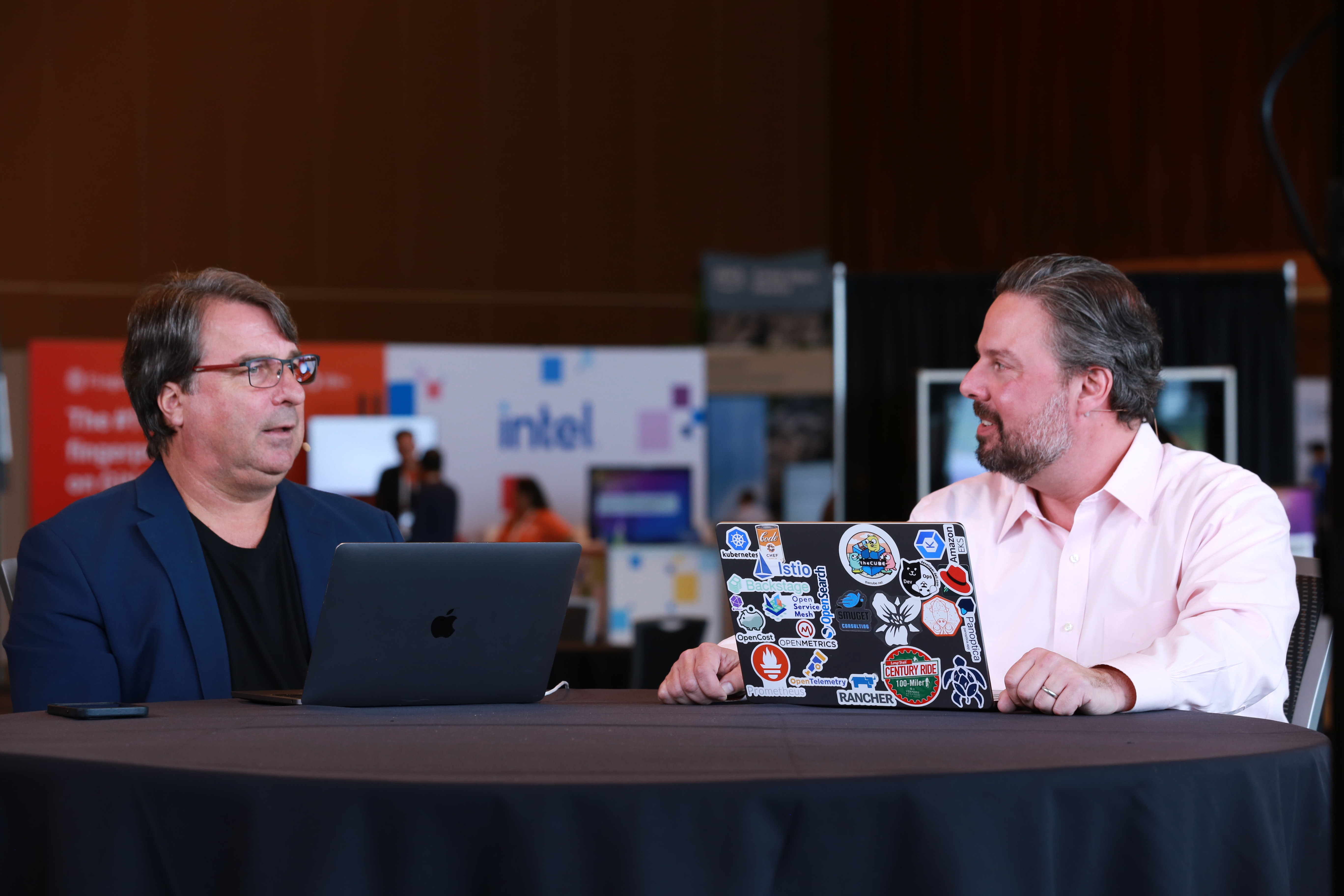 AI
AI
 AI
AI
 AI
AI
This week’s Open Source Summit NA brought together industry experts and analysts to delve into the future of open source in the face of emerging technologies, such as artificial intelligence.
One of the central topics of discussion was the impact of AI on open source. TheCUBE’s analysts debated whether open source could handle the impending AI revolution.
“We started the day off saying open source is in trouble because it’s winning, and AI is coming” said theCUBE host and industry analyst John Furrier (pictured, left). “Can it handle the tornado of AI and the momentum that’s going to come with that? I don’t think it’s going to have any effect of toppling over the open-source foundation or anything we do with open source.”
Furrier’s co-analyst and co-host Rob Strechay (right) agreed, pointing out that organizations are considering AI as another tool in their toolbelt. The technology could help augment open-source projects, especially with documentation, he explained.
“It’s not going to replace the people coding and participating,” Strechay said.
Furrier and Strechay discussed the potential impact of AI on open source, platform engineering and the importance of ecosystems at this week’s Open Source Summit NA, during an exclusive broadcast on theCUBE, SiliconANGLE Media’s livestreaming studio.
Platform engineering emerged as another significant topic during the event. Setting standards and compliance while still preserving developer creativity is critical, according to Furrier and Strechay.
“One of the big pieces of stress in the system is standards and compliance and governance versus … using a new service or downloading a new package or a new library,” Strechay said.
Platform engineering is becoming the new IT, setting the standards for applications that utilize platform features with APIs and dependencies, he added.
Ecosystems, their evolution and their role in the next generation of open source were extensively explored. Earlier in the day, the analysts talked with Diane Mueller, managing director of research and advisory services at Bitergium SLL, about the need to monitor ecosystem health and encouraging ongoing contributions. The discussion shed light on the need for collaboration and data-driven monitoring to ensure the vitality of open-source ecosystems.
“The contributors that are at the end consumers and what percentage of the actual contributions are coming from those consumers, to me, is a big piece of it,” Strechay said. “If the consumers are actually contributing back … I think you have a pretty thriving ecosystem.”
This week’s event also delved into the entrepreneurial aspects of open source, particularly in relation to wealth creation and product development. There are unique opportunities that open source presents to entrepreneurs, according to Furrier and Strechay, who spoke with Manfred Moser, director of technical content at Starburst Data Inc., earlier in the day. Moser said he loves attending Open Source Summit because of the collaboration possibilities.
“If you’re a product person, you bring something to open source, you’re going to get collaboration,” Furrier said. “This market is still robust for product opportunities given the shift to AI and given the shift to cloud-native, given the shift to the security. Now, the question is, where do you land?”
The discussions underscored the importance of product-market fit and the role of foundations in supporting and guiding entrepreneurs to success. And as the Summit’s day 1 sessions progressed, it became evident that AI, platform engineering and ecosystems were intertwined in the open-source landscape. The intersection of these areas creates both challenges and opportunities, and Furrier and Strechay debated the potential strategies of major companies injecting resources and funding into open source as a means to revitalize and leverage its growth potential.
“There could be a competitive strategy from the big companies to inject Kool-Aid into open source, to revitalize as a steroid, as a growth hack,” Furrier said.
Will open source thrive amidst the AI revolution? Or could AI spell trouble for the industry?
“People who are data-centric, data thinkers love the AI story,” Furrier said. “Everyone else was like … it’s not yet ready for prime time. I’m bullish on AI. I think it’s going be a game changer. I think it will shake the industry.”
Here’s the complete video interview, part of SiliconANGLE’s and theCUBE’s coverage of Open Source Summit NA:
Support our mission to keep content open and free by engaging with theCUBE community. Join theCUBE’s Alumni Trust Network, where technology leaders connect, share intelligence and create opportunities.
Founded by tech visionaries John Furrier and Dave Vellante, SiliconANGLE Media has built a dynamic ecosystem of industry-leading digital media brands that reach 15+ million elite tech professionals. Our new proprietary theCUBE AI Video Cloud is breaking ground in audience interaction, leveraging theCUBEai.com neural network to help technology companies make data-driven decisions and stay at the forefront of industry conversations.